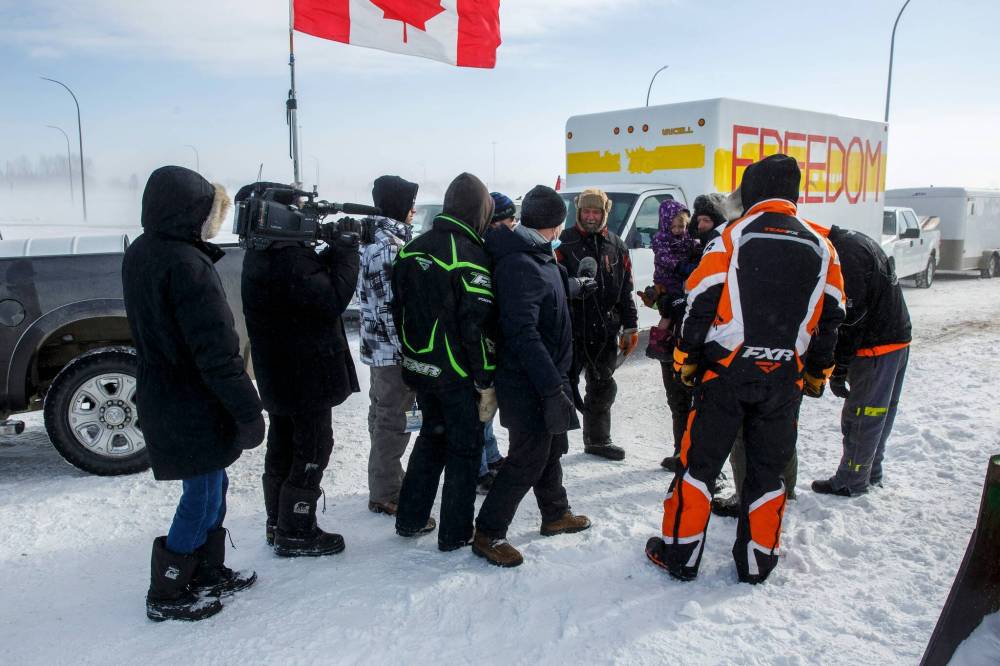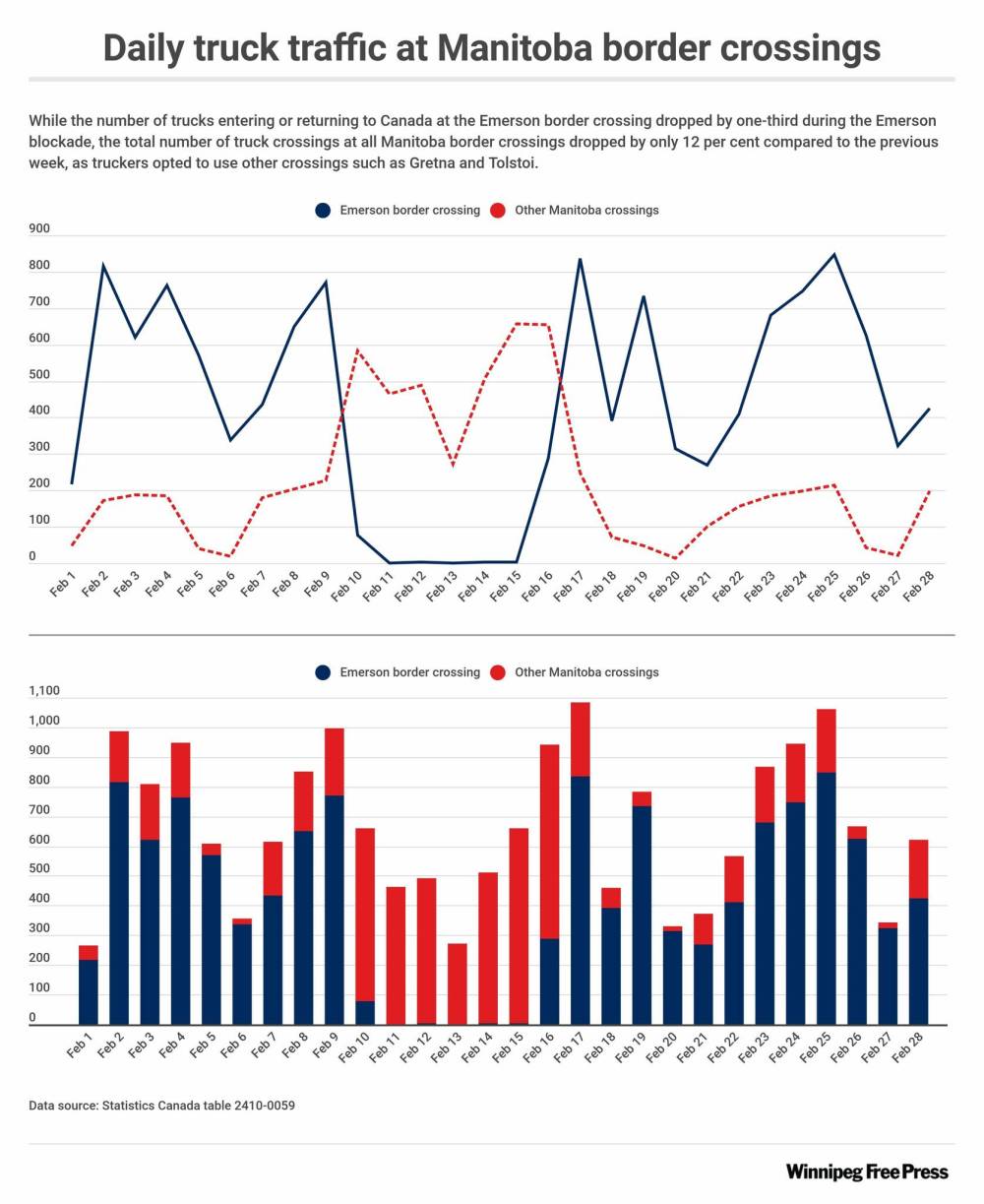Exports slowed by border protest
Truck crossings between Manitoba and U.S. dropped during February convoy blockade
Advertisement
Read this article for free:
or
Already have an account? Log in here »
To continue reading, please subscribe:
Monthly Digital Subscription
$0 for the first 4 weeks*
- Enjoy unlimited reading on winnipegfreepress.com
- Read the E-Edition, our digital replica newspaper
- Access News Break, our award-winning app
- Play interactive puzzles
*No charge for 4 weeks then price increases to the regular rate of $19.00 plus GST every four weeks. Offer available to new and qualified returning subscribers only. Cancel any time.
Monthly Digital Subscription
$4.75/week*
- Enjoy unlimited reading on winnipegfreepress.com
- Read the E-Edition, our digital replica newspaper
- Access News Break, our award-winning app
- Play interactive puzzles
*Billed as $19 plus GST every four weeks. Cancel any time.
To continue reading, please subscribe:
Add Free Press access to your Brandon Sun subscription for only an additional
$1 for the first 4 weeks*
*Your next subscription payment will increase by $1.00 and you will be charged $16.99 plus GST for four weeks. After four weeks, your payment will increase to $23.99 plus GST every four weeks.
Read unlimited articles for free today:
or
Already have an account? Log in here »
Hey there, time traveller!
This article was published 13/05/2022 (1306 days ago), so information in it may no longer be current.
OTTAWA — February’s blockade of the Canada-U.S. border at Emerson put only a dent in trade between Manitoba and the United States, but industry experts say fresh data from that period show troubling trends.
“There’s a lot of instability in our economy right now and worldwide; I don’t think we need to have something added to it,” said Barry Prentice, a logistics expert at the University of Manitoba.
Protesters closed the border crossing from Feb. 10 to 16, as part of the “freedom convoy” demonstrations that occupied downtown Ottawa and other Canada-U.S. border crossings, in opposition to COVID-19 vaccine mandates.
The Trudeau government cited the economic harm caused by the protests when it invoked the Emergencies Act on Feb. 14 to get rid of the protests.
“In Emerson, Manitoba, about $73 million in daily trade has been affected by the blockades,” Finance Minister Chrystia Freeland said at the time.
However, Statistics Canada data show minimal change to the value of goods shipped from the U.S. to Manitoba in February. It amounted to $1.4 billion, which is the average monthly amount for the preceding 12 months.
Exports did take a hit. In February, $825 million was shipped from Manitoba to the U.S., compared with the monthly average of just over $1 billion in the previous 12 months. The value of exports of pharmaceutical and medicinal products was cut in half.
“Overall, the blocked border crossings appear to have had little impact on the aggregate values of Canadian imports and exports in February,” reads a Statistics Canada report last month.
Another dataset from the federal agency, which details daily cross-border traffic, shows that Emerson lost nearly one-third of its usual trucking traffic in February 2022 compared with one month earlier.
The data show that truckers often used other Manitoba crossings; Gretna jumped to a daily peak of 188 trucks from the usual 35 trucks per day, and Tolstoi had nearly 200 trucks one day, instead of its usual dozen.
“The carriers familiar with the area would say ‘why bother; let’s just go around it,’” Prentice said.
Still, the number of truck crossings between Manitoba and the U.S. dropped 12 per cent in February 2022 compared with the same month in 2021.

Given that number is larger than the hit to the value of goods traded, Prentice said lower-value goods, such as agricultural commodities, must have been shipped.
Ron Koslowsky, Manitoba head for the Canadian Manufacturers and Exporters, argued that even a slight decline in the amount of goods traded must be interpreted through the lens of inflation.
“Prices have gone up significantly, so what that means is that effectively, the amount of goods being shipped has dropped,” he said. “It’s not all good news.”
Prentice and Koslowsky argued the Liberal government’s decision to mandate COVID-19 vaccines for truckers likely caused more economic harm than safety benefits.
The Canadian Trucking Alliance has said just 10 to 15 per cent of drivers are unvaccinated. Prentice argued blocking them from working by imposing the mandate strained the economy, which was grappling with supply-chain issues.
“The strangest part of all (is) the government could have easily extended its exemption for another few months,” said Prentice. “Truckers by definition are pretty independent people, and they don’t like being pushed around.”
Koslowsky said demand for truckers rose as soon as Ottawa’s mandate took effect Jan. 15.
“We got a lot of pushback from members, saying they could not find trucks to deliver goods, because of the vaccine mandate that had been imposed,” he said.
“That was probably bigger impact over a longer period of time; the blockade was a very short time.”
Though provinces have been lifting their vaccine mandates, the Liberals are still following through on their pledge last December to require vaccination in the roughly six per cent of private workplaces that are regulated by Ottawa.
“We continue to follow the science on COVID-19,” the office of Labour Minister Seamus O’Regan wrote Thursday.
The rules would likely affect grain elevators as well as feed and seed mills.
Koslowsky argued Canadians should brace for fewer goods to be available due to government policies, and for others to be more expensive.
“It seems very incongruent to the way the world is going,” he said about more vaccination mandates.
“This is something we’re going to have to live with.”
Meanwhile, Manitoba is the region most opposed to protests that cause economic disruption, in a poll the Angus-Reid Institute released Thursday.
In a May 4 to 6 poll, the agency found 60 per cent of surveyed Manitobans would rather protect economic interests, even if it limits protests.
Alberta was split evenly on that question, while Saskatchewan respondents sided 56 per cent toward protest rights.
In the poll of 1,992 Canadians, 46 per cent of Canadians agreed that “invoking the Emergency Act was necessary to clear out the protesters,” while 34 per cent said it was unnecessary as “police had the power to clear out the protests without it” and another 15 per cent said “the protesters should have been left alone.” Four per cent were unsure.
dylan.robertson@freepress.mb.ca








